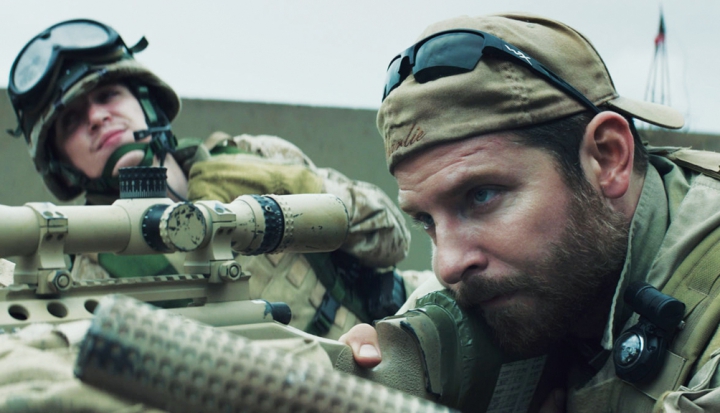Even if you empathize with the film’s main character, American Sniper is still a one-sided tale of what some call America’s greatest foreign policy disaster.
A very strange convergence of events took place this February when American Sniper, Clint Eastwood’s biopic about Iraq War hero Chris Kyle, was up for most of the major Academy Awards, and in Texas, another Iraq veteran, Eddie Ray Routh, was on trial for Kyle’s murder.
At the same time, in real-life Iraq, most of the territory that U.S. soldiers fought, killed, and died over was back in the hands of ideological extremists. And in Washington, discussion began about whether defeating the self-proclaimed Islamic State in Iraq might require the return of U.S. ground troops.
Of course, American Sniper mostly struck out at the Oscars, which conservative commentators quickly blamed on Hollywood’s perceived liberal bias. And it’s true that from the time of its release American Sniper was dogged by claims that it painted a one-sided, jingoistic picture of what some call America’s greatest foreign policy disaster. Critics point to Kyle’s dehumanization of the people he calls “savages,” as he executes them from as far as a mile away. Some have also noted apparent lies in Kyle’s memoir upon which the film is based, including his claim to have killed as many as 30 looters in post-Katrina New Orleans.
Still, many thoughtful film critics have seen American Sniper as a nuanced study of the consequences of war. Some have even endorsed Eastwood’s claim that the movie is “anti-war.” Certainly the toll violence takes on the souls of the violent has been a theme of Eastwood’s work, from A Fistful of Dollars and Dirty Harry all the way through to Unforgiven and his World War II films, Flags of Our Fathers and Letters from Iwo Jima. In any case, the director has never shown much interest in using his art to propagate his eccentric Republican politics.
So when I finally joined the shopping mall throngs to see American Sniper, I was prepared to empathize with a tragic character placed in a war he didn’t declare and driven by patriotism, loyalty to his comrades, and a commitment to personal excellence. As the deadliest sniper in the history of the U.S. military, Kyle killed at least 160 Iraqis, including, as we see in the film, a mother and child team bent on throwing a large grenade into a crowd of U.S. soldiers. A man ordered to do those kinds of things is bound to pay a spiritual price. Perhaps Kyle, I thought, was simply another victim of the Bush-Cheney folly.
And maybe he was. But I’m afraid that what’s on the screen in American Sniper is—you guessed it—a mostly one-sided, jingoistic picture of America’s greatest foreign policy disaster.
To be fair, Bradley Cooper’s performance as Kyle is a minor miracle. Along with gaining 40 pounds for the part, Cooper exudes the energy, confidence, and charisma that made his fellow soldiers call Kyle “The Legend.” And the film doesn’t really cross the line into blatant jingoism until the closing sequence of events around Kyle’s funeral, which features shot after shot of enormous American flags, and Kyle’s memorial service image on the giant video screen at the Dallas Cowboys football stadium.
Throughout the movie the enemy is always “Al Qaeda,” not a more generic “resistance” or “insurgency,” and Americans are there to bring freedom to the Iraqis. One U.S. soldier does betray doubts about the American mission, and, when that solider dies in combat, Kyle blames his death on those doubts.
Wrongheaded as that may be, we can understand Kyle and Eastwood’s other characters must believe what they believe in order to do what they are assigned to do. But with that flag-waving coda, Eastwood baptizes his character’s version of the war and sets us up for a bizarre Islamic State sequel in which some latter day Rambo asks, as Sylvester Stallone did in Vietnam, “Do we get to win this time?”
History teaches that when we occupy other people’s lands, we don’t get to win. That’s what American Sniper and Washington interventionists alike can’t seem to see. True, some of those Iraqi “savages” were ideologically driven extremists, but most were people defending their homeland from an invader.
American Sniper is not the first pass Hollywood has made at dramatizing the Iraq War. There was also The Hurt Locker, which won the 2009 Oscar for Best Picture, and the Best Director prize for Kathryn Bigelow (who later made Zero Dark Thirty, about the killing of Osama bin Laden). The Hurt Locker was about an American who specialized in disarming improvised explosive devices. It painted a more ambivalent picture of its troubled protagonist. He was, like Kyle, a legend at his work, but he was also an arrogant, insubordinate pain in the neck. But The Hurt Locker still treated the Iraqis mostly as props and extras in the drama of their own country.
The only Hollywood movie to show some understanding of the Iraqi side of the war was Brian De Palma’s 2007 film, Redacted. In this film, an American army platoon is being filmed by an embedded French documentary crew when an atrocity occurs. In footage from the French crew’s production, De Palma is able, for instance, to show why so many Iraqis were killed for apparently trying to run clearly marked U.S. roadblocks—many of them were illiterate, Americans were yelling at them in English, American hand signals have different meanings in Iraqi culture, etc. We also feel the anger that must have boiled when male U.S. soldiers at checkpoints patted down the bodies of Iraqi women. Of such stuff is an insurgency made.
De Palma’s film was, of course, a box office flop. American Sniper has already made more money than any war movie in Hollywood history.
This column appeared in the May 2015 issue of U.S. Catholic (Vol. 80, No. 5, pages 40-41).
Image: Photo courtesy of Warner Bros.















Add comment